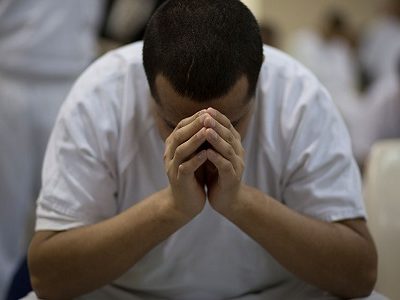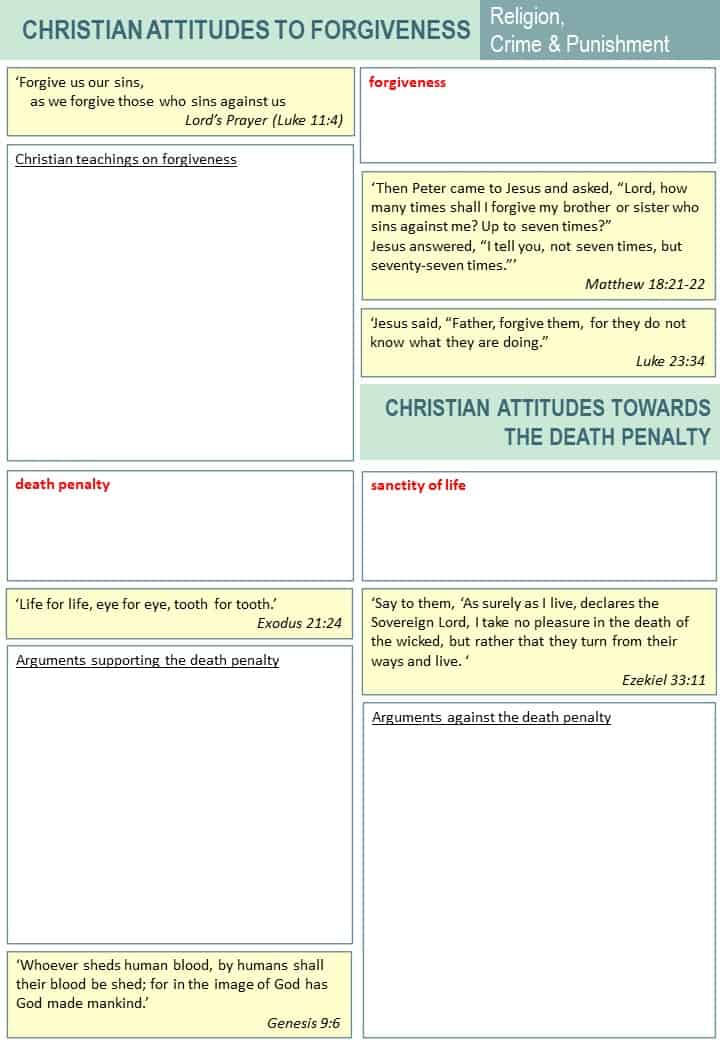Theme E
Forgiveness & the death penalty
Religion & punishment
• Forgiveness.
• The death penalty.
• Ethical arguments related to the death penalty, including those based on the principle of utility
and sanctity of life.
Forgiveness
Give two religious beliefs about forgiveness. (2)
Spec 2
For theists, God is the ultimate source of forgiveness/forgiveness is an important step in reconciliation/forgiveness does not replace punishment/forgiveness brings inner peace/shows compassion/God will forgive those who ask in faith/God requires humans to forgive whatever offence has been committed, etc
Explain two similar beliefs in contemporary British society about the importance of forgiveness. (4)
2022
Most religions teach that it is important to be compassionate, tender, kind / people should reflect God’s forgiving nature / let go of the harm or hurt that has been caused / the Golden Rules / forgiveness does not mean that it is a replacement for punishment / some may say forgive and forget, etc.
Christianity
Christians are expected to forgive others and they believe that then God will forgive them / “Forgive us our sins, as we forgive those who sin against us” – Lord’s Prayer / Peter asked Jesus, “Lord, how many times shall I forgive my brother when he sins against me? Up to seven times?” Jesus answered, “I tell you, not seven times, but seventy-seven times.” Matthew 18 : 21-22 / this means an unlimited amount / Jesus on the cross prayed, “Father forgive them, for they do not know what they are doing.” Luke 23 : 34 / but many Christians believe that forgiveness is not meant to be a
replacement for punishment, etc
Judaism
Jews believe that forgiveness should not be the automatic response of the victim / instead those offenders should show remorse to their victims and honestly ask for their forgiveness / the Ten Days of Repentance between Rosh Hashanah and Yom Kippur are traditionally the time to ask forgiveness if it hasn’t been asked before / on Yom Kippur Jews believe that if they have sought forgiveness then God will forgive them / the people who have been hurt have a duty to forgive if they are genuinely asked / “Come, let us reach an understanding, – says the Lord. Be your sins like crimson, They can turn snow-white; Be they red as dyed wool, They can become like fleece.” Isaiah
1 : 18, etc.
Explain two religious beliefs about forgiveness. (5)
2020
Religions believe in the importance of forgiveness / this does not mean to excuse or forget what has happened / it enables people to move on and let go of the desire to see the other person being punished / recognises that the other person may change, etc.
Christianity
Core belief of Christianity is to forgive others regardless of what they have done / in return God will forgive them / The Lord’s Prayer – ‘Forgive us our sins, as we forgive those who sin against us’ / many Christians would say that forgiveness isn’t necessarily a replacement for punishment / Jesus’ reply to Peter’s question – Matthew 18 : 21-22 / there can be no limit to forgiveness / Jesus’ words on the cross “Father forgive them, for they do not know what they are doing” / Jesus died that people might be forgiven, etc.
Judaism
Forgiveness is a core belief and is strongly linked with repentance / Ten Days of Repentance between Rosh Hashanah and Yom Kippur are traditionally the time to ask for forgiveness / on Yom Kippur Jews traditionally believe that sins between people and God are forgiven / the person wronged has a duty to forgive if genuinely asked / Isaiah 1:18 “Be your sins like crimson. They can turn snow-white; Be they red as dyed wool, They can become like fleece.” / forgiveness is not a replacement for punishment, etc.
Death penalty
Explain two contrasting beliefs in contemporary British society about the death penalty for murder (4)
Spec 1
Christianity
Many denominations oppose the death penalty/Jesus replaced the concept of ‘an eye for an eye’ with ‘turn the other cheek’ (Matthew 5:38–39)/when asked for his opinion on a particular case, Jesus said, ‘If anyone of you is without sin, let him be the first to throw a stone’ (John 8:7)/‘do not be overcome by evil; but overcome evil with good’ (Romans 12:21)/‘I am passionately opposed to the death penalty for anyone…I think, myself, that it is an obscenity’ Desmond Tutu)/the Catechism of the Catholic Church permits the death penalty only if an absolute necessity, but thinks that other options for punishment make such cases ‘very rare, if not practically non-existent’/some Christians think that ‘an eye for an eye’ should apply to murder.
Judaism
The Torah prescribes the death penalty for murder/seen as justice and essential to the preservation of the community/‘Life for life, eye for eye, tooth for tooth …’ (Exodus 21:23–24)/‘A man who spills human blood, his own blood shall be spilled by man because God made man in His own image.’ (Genesis 9:6)/its deterrent value was a matter of great debate among 1st and 2nd century rabbis: Rabbi Tarfon and Rabbi Akiva say, ‘If we had been among the Sanhedrin, no one would ever have been executed.’ Rabbi Simon ben Gamaliel responds, ‘Such an attitude would increase bloodshed in Israel.’/Judaism sets so many conditions to be met for the death penalty to be given that sentencing a person to death is virtually impossible/this reflects concern that a mistake might be made/many British Jews would agree with this modern statement: ‘While traditional Judaism clearly contemplates and condones the
death penalty as the ultimate sanction within a legitimate legal system, Judaism simultaneously insists that capital punishment be administered by a process that ensures accuracy as well as justice; our valuing of human life as infinite demands no less’ (Union of Orthodox Jewish Congregations).
Explain two religious beliefs about the death penalty. (5)
Spec 2
• death penalty is no better than murder/only God has the right to take life/retribution is not the best aim of punishment/not compassionate loving nor caring/‘do not kill’/all religions have teachings about taking life being wrong/allows no chance to reform
nor show repentance/the state is no better than the murderer, etc
• innocent people may mistakenly be killed/only God knows for certain if a person is guilty of a serious crime, etc
• saves taxpayer’s money which can be better spend on the poor and underprivileged as prison is an expensive option/those who commit serious crimes get what they deserve/society is protected because no chance of reoffending/deterrence, etc.
Christianity
Removes possibility of repentance/only God can take life that he created/‘whoever sheds the blood of man, by man shall his blood be shed’ (Genesis)/death penalty is a deterrent that helps to prevent other serious crime/some Christian countries use death penalty (eg some states in USA), etc.
Judaism
Israel retains the death penalty but the standard of proof is very high which makes it virtually impossible to use/deterrent/‘an eye for an eye…’/‘I take no pleasure in the death of the wicked, but rather that they turn from their ways and live’ (Ezekiel), etc.
Explain two religious reasons why some people are against the death penalty. (5)
2019
Ethically it is seen as wrong as it is against the sanctity of life / mistakes can be made and innocent people could be killed so the ultimate judge should be God / killing is ethically wrong, even if it involves killing a serious offender / the death penalty is against the law in the UK and religious believers should keep the law / makes the executioner a murderer and is playing God / God will forgive penitent offenders however serious the offence so they should remain alive / the most important aim of punishment is to reform, the death penalty does not allow this to happen / it is neither loving or compassionate, etc.
Christianity
Most Christians oppose the death penalty as they believe in the sanctity of life / only God has the right to take life / Jesus taught that forgiveness is important and warned not to judge each other harshly / Ezekiel 33:11 – ‘I take no pleasure in the death of the wicked, but rather that they turn away from their ways and live’ / Ten Commandments – ‘Do not kill’ / punishments should help towards reforming an offender / statements by Pope Francis declaring that every life is sacred, etc
Judaism
Jews believe in the sanctity of life / the Talmud makes it clear that the death penalty should be rarely used / other forms of punishment should be used / abolished in Israel in 1954 except for treason in time of war and for those who committed crimes during the Holocaust / most Jews emphasise the need to give the criminal the chance to reform / only God should take life / Ten Commandments say – ‘Do not kill’ / people have been wrongly convicted of murder, etc.
‘The death penalty should never be used.’ (12)
2018
Arguments in support
Killing is wrong, even if it involves killing a serious offender. The death penalty not allowed in the UK.
The most important aim of punishment is to reform. The death penalty may not allow time for repentance. It is neither loving or compassionate.
Retribution is wrong as an aim of punishment. ‘An eye for an eye’ is about fair justice, not retribution and killing.
It is against sanctity of life and is playing God. God will forgive a penitent offender however serious the offence so they should remain alive.
Does not recognise possible cause of the offence.
Opposed by some religious leaders eg. Gandhi.
Contradicts the law on murder and makes the executor a murderer.
Mistakes can be made and innocent people could be killed.
It is more expensive to use the death penalty as a punishment than life imprisonment eg. USA etc.
Arguments in support of other views
It acts as a deterrent and protects society.
It is retribution for serious offences and seen by some as more loving to kill offenders so they cannot offend against society any further.
The idea of ‘an eye for an eye’ supports capital punishment
Some religious leaders support it in extreme cases. It allows justice to be seen to be done.
Some offenders cannot be reformed. It sets an example to the rest of society.
For some countries it is cheaper than other options. Life imprisonment is an expensive alternative, etc.
Christianity
Death penalty opposed by most Christians / belief that only God has the right to take life / Jesus taught that forgiveness is important and warned not to judge each other harshly / Ezekiel 33: 11 / Ten Commandment – ‘Do not kill’ / punishments should help towards reforming an offender / some do support the use of the death penalty making reference to Exodus 21 – ‘An eye for an eye ..life for a life’ / might deter people from serious crime, etc.
Judaism
The Torah identifies 36 offences such as murder and idol worship that should be punishable by death / the Talmud makes it clear that the death penalty should be rarely used / other forms of punishment should be used / abolished in Israel in 1954 except for treason in time of war and for those who committed crimes during the Holocaust / only used once for Adolf Eichmann in 1962 / some Jews support using the death penalty – Genesis 9:6 / Exodus 21:23-24 / some want retribution or believe it deters offences / most emphasise the need to give the criminal the chance to reform / only God should take life, etc.
Resources
Videos



